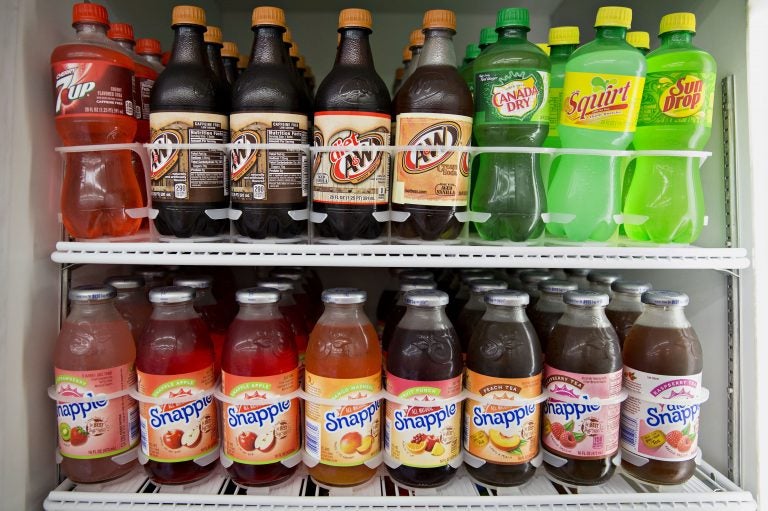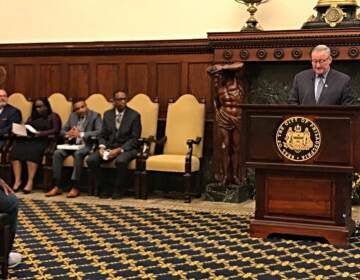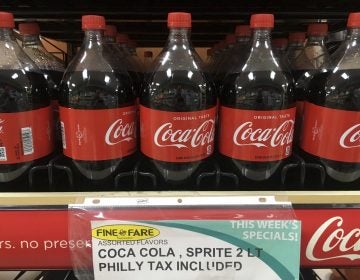Doubts if new council will take on mayor’s soda tax
Despite calls for change, the outgoing Philadelphia City Council never managed to chip away at Mayor Jim Kenney’s soda tax.

Despite calls for change, the outgoing Philadelphia City Council never managed to chip away at Mayor Jim Kenney’s soda tax. (Daniel Acker/Getty Images)
This article originally appeared on The Philadelphia Tribune.
_
Despite calls for change, the outgoing Philadelphia City Council never managed to chip away at Mayor Jim Kenney’s soda tax.
Separate efforts by Council members María Quiñones-Sánchez and Allan Domb to conduct studies and hold hearings on the 1.5-cent-per-ounce sweetened beverage tax never materialized before the end of this City Council’s term on Dec. 12.
Quiñones-Sánchez, who has historically opposed the soda tax, in March called for an independent study of the soda tax and a hearing. A hearing was never held, and it was not clear whether Quiñones-Sánchez ever commissioned her study, as the councilwoman did not return requests for comment.
Domb said he was still interested in analyzing how much revenue the city was losing due to shoppers going beyond the city’s borders to purchase sweetened beverages.
Domb said he would support reducing the soda tax if a reduction could compel residents to shop in the city and continue to fully fund programs the tax supports, but he did not commit to reintroducing his legislation again during the next council session.
“At what point will people not drive over the line to buy their beverages?” Domb asked. “Can we keep the sales, and the business and the jobs in the city of Philadelphia.”
Mike Dunn, a spokesman for the Kenney administration, said in an email the administration welcomed independent studies of the tax to complement ongoing studies, which would increase transparency and counter disinformation about the tax from the beverage industry.
The mayor would oppose any legislation that would reduce revenues raised by the sweetened beverage tax because that would jeopardize the programs funded by the tax and have other negative repercussions, Dunn said.
“The measure would also severely damage the City in the financial markets when it seeks future borrowings, as it would send a signal that our commitments to adding new resources cannot be relied on,” Dunn added.
This 17-member City Council voted to implement Kenney’s soda tax in 2016 by a vote of 13-4. Voting against the legislation was Quiñones-Sánchez and Republican Council members David Oh, Brian O’Neill and Al Taubenberger.
All unmoved legislation and hearings die at the end of the year to make way for a new crop of City Council members who will take the oath of office on Jan. 6.
The outgoing council’s inability to kickstart any serious legislative efforts to consider changes to the soda tax raises doubts about whether the new council will have any better luck over the next four-year term.
Not only has one of the opponents of the tax lost his seat (Taubenberger), but the four freshmen council members who won in November did not campaign against the soda tax.
The sweetened beverage tax is among Mayor Jim Kenney’s signature legislative achievements. The revenue generated from the tax is supposed to pay for pre-kindergarten, Community Schools, and an infrastructure program to improve recreation centers, libraries, parks and other public spaces. The tax has hauled in an estimated $193.8 million through June and was expected to pull in another $75.8 million this fiscal year.
A member of the city’s Department of Public Health was currently working with researchers from the University of Pennsylvania and other universities on a comprehensive evaluation of Philadelphia’s beverage tax, Dunn said.
Researchers were looking at data related to large and small stores, and the research will include data about individual purchasing habits and interviews with store owners. Dunn could not immediately say when the research was expected to be released.
A report this year found that sales of sweetened beverages outside the were boosted during the first year the soda tax was in effect in 2017. While sales of sweetened beverages plummeted 51% at chain food retailers in Philadelphia, an uptick in sales outside the city resulted in a reduction in overall sales of sweetened beverages of 38%.
WHYY is your source for fact-based, in-depth journalism and information. As a nonprofit organization, we rely on financial support from readers like you. Please give today.



